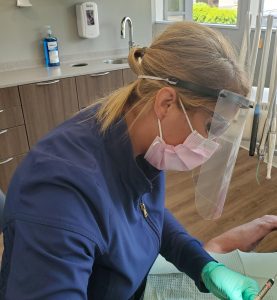
Have you noticed after you brush your teeth and rinse, a little red in the sink or on your brush? You may have the beginnings of gum disease. Don’t panic! Life-Centered Dentistry can help you get healthy. Call to schedule a hygiene appointment–616-453-3111.
When your gums look red and swollen, it’s called gingivitis. Gingivitis is an inflammation of the gum tissue. You know you have gingivitis if your gums bleed easily when you brush or floss, or your gums may feel a little tender. It is most common behind the front lower teeth and around the molars. When left untreated, the inflammation continues down along the roots. Since gum disease starts out painlessly, it can progress before you notice it.
Have you heard someone say their gums are receding? It may look like their teeth are getting longer, but that’s not what’s happening. As gingivitis progresses, the gum tissue pulls away from the teeth, which makes the teeth look longer and makes them sensitive to hot, cold and sugar. That’s because the roots are not protected by hard enamel like the top of your teeth.
It is difficult, if not impossible, to get your toothbrush to reach under the gums. When that happens, the plaque or tartar hardens on the roots. Your hygienist will have to use special instruments to remove it. That’s called gum disease, perio or periodontal disease.
What happens if you don’t come in? Your teeth will get wiggly and eventually, fall out! At Life-Centered Dentistry, we care for your total well-being. Bacteria from an unhealthy mouth gets in your bloodstream and can harm your entire body. Some of the consequences of not getting your periodontal disease treated can be worsened diabetes, heart disease, osteoporosis, pneumonia, and cancer. If you come in regularly, we will catch the disease early and stop it before serious damage occurs.
Is it possible to get regular dental cleanings and still get perio? Yes! As you get older, your body changes. Changes in your body can affect the health of your gums. And changes in the health of your gums can affect your body’s health. Learn more.

